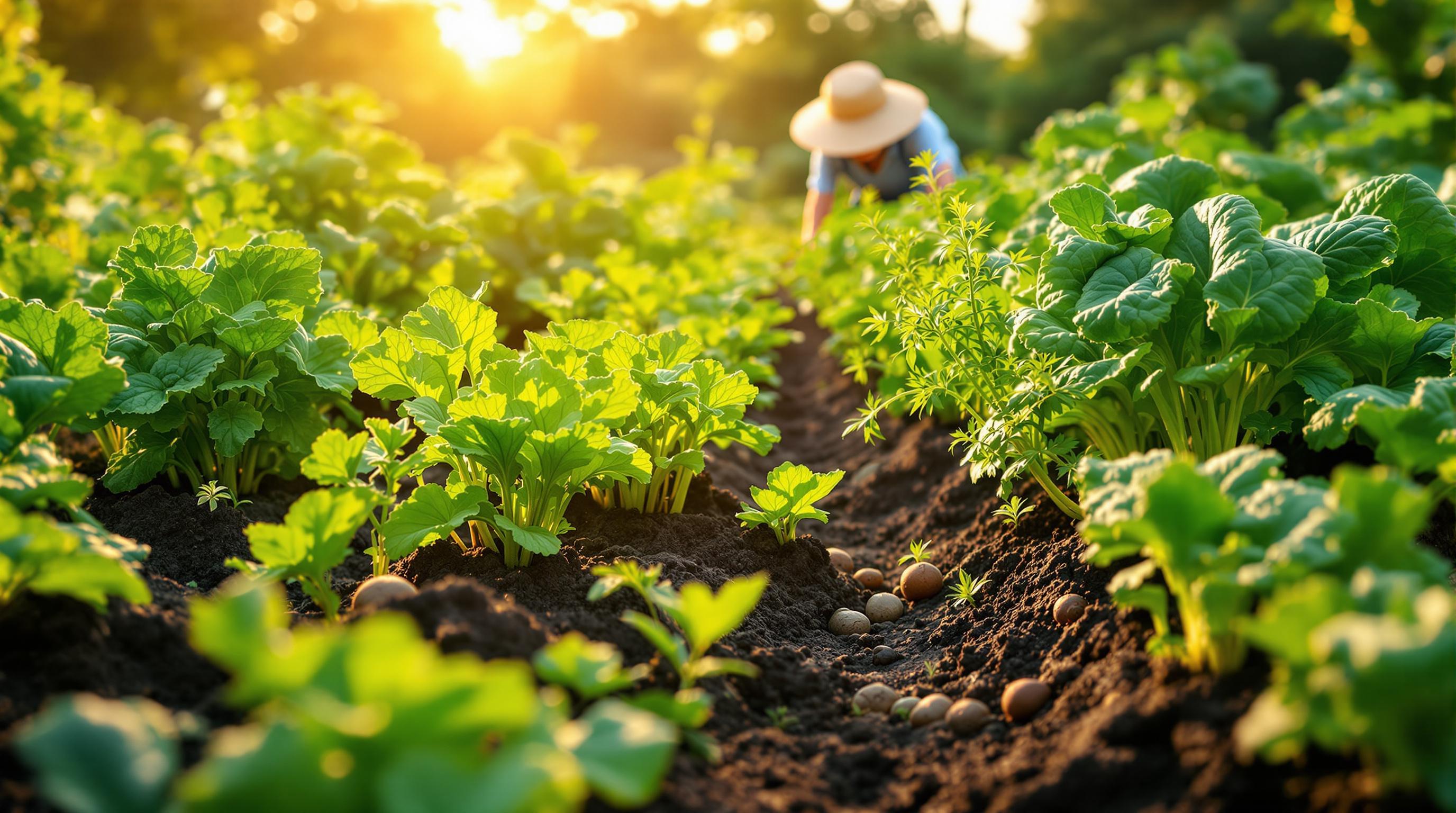Unlocking the Secrets of KNF: The Principles and Practices of Natural Farming
Korean Natural Farming (KNF) is a holistic growing method that harnesses the power of Indigenous Microorganisms (IMOs) and fermented solutions like Fermented Plant Juice (FPJ), Lactic Acid Bacteria Serum (LABS), and Water-Soluble Calcium (WCA) to build self-sustaining ecosystems. By working with nature rather than against it, KNF reduces water usage by up to 40%, lowers fertilizer costs, improves soil fertility, and strengthens plant resilience.
Whether you're cultivating a small backyard garden, managing a commercial farm, or experimenting with hydroponics, KNF offers practical, scalable techniques—like making FPJ from local plants and sugar, applying LABS to boost microbial life, and using WCA from eggshells to support plant structure—that can elevate your growing results naturally.
Quick Overview of KNF Solutions:
| Solution | Purpose | Dilution Rate | Frequency |
|---|---|---|---|
| FPJ | Growth hormones & nutrients | 1:500–1000 | Weekly |
| LABS | Boost soil microbes | 1:1000 | Every 2–4 weeks |
| WCA | Strengthen plant structures | 1:1000 | Monthly |
KNF works with nature, not against it, making it a sustainable choice for gardeners and farmers alike.
KNF Basic Methods
KNF relies on local resources and naturally fermented inputs, using Indigenous Microorganisms to promote healthier plants and soil.
Working with IMOs
Indigenous Microorganisms (IMOs) break down organic matter, fix nitrogen, and suppress pathogens. To gather IMOs:
-
Use a ventilated wooden box lined with plain cooked rice.
-
Place the box in a shaded area with natural leaf litter.
-
After 3–5 days, collect the white mold growing on the rice.
Apply IMO solutions 14 days before planting in low-productivity fields. Spread thinly a week before planting over mulched fields.
Natural Input Types
-
FPJ: Made by fermenting fast-growing plant material with brown sugar (5–7 days). Supplies growth hormones and nutrients.
-
LABS: Created by fermenting rice wash water with milk. Boosts soil biology and controls pathogens. Dilution: 1:5000–10000.
-
WCA: Made by reacting eggshells with vinegar (7–14 days). Enhances plant structure and fruiting.
Soil Care Methods
KNF encourages low-impact practices:
-
Mulching: Protects structure and supports microbes.
-
Minimal Tillage: Preserves soil layers and organisms.
-
Cover Cropping: Adds organic matter and protects soil.
Example: Sacred Sun Farms in Montana saw distinct cannabis terpene profiles after adopting KNF.
Crafting Your Own Korean Natural Farming Inputs
How to Make FPJ:
-
Gather young plant material before sunrise.
-
Chop and mix with equal weight of brown sugar.
-
Store in breathable container for 5–7 days.
-
Strain and seal.
-
Use: Dilute 1:500–1000 for foliar, 1:1000 for soil. Apply weekly.
How to Make LABS
-
Mix unpasteurized milk with rice wash.
-
Cover and ferment for 5–7 days.
-
Skim, mix with molasses, ferment another 5–7 days.
-
Strain and refrigerate.
-
Storage: Up to 12 months.
How to Make WCA
-
Bake eggshells at 180°C for 30 mins, crush finely.
-
Mix with vinegar (10:1 ratio).
-
Ferment 7–14 days. Strain and seal.
| Solution | Dilution Rate | Frequency | Storage Life |
| FPJ | 1:500–1000 | Weekly | 6–12 months |
| LABS | 1:1000 | Every 2–4 weeks | 12 months |
| WCA | 1:1000 | Monthly | 6 months |
Safety Tip: Always wear gloves and label containers clearly.
Using KNF in Your Garden
KNF for Hydroponics
Add KNF inputs to nutrient reservoirs, monitoring pH and EC.
| Input | Dilution | Frequency | Notes |
| LABS | 1:1000 | Weekly | Watch pH shifts |
| FPJ | 1:1000 | Every 1–2 weeks | Best during veg phase |
Tips:
-
Maintain pH: 5.5–6.5
-
Monitor EC 2–3x per week
-
Keep water below 21°C
-
Use light-blocking materials
Hydroponic systems using KNF can see up to 30% faster growth.
KNF for Outdoor Gardens
Foliar sprays and soil applications enrich soil ecosystems.
-
Spray in early morning or late evening
-
Use filtered/dechlorinated water
-
Maintain regular application schedule
Expert Tip: Chris Trump suggests a blend of FPJ, OHN, and WCA diluted 1:1000 for regular use. Dr. Cho emphasizes training local microbes to adapt to your space.
A 3-year study reported:
-
46% increase in soil organic matter
-
32% rise in available phosphorus
Fixing Common Problems
Boosting Microbial Activity
-
Mulch to insulate soil
-
Use warm water with FPJ
-
Add compost or leaf mold
-
Apply LABS regularly
Managing Pests with OHN
-
Mix garlic, ginger, peppers with sugar (1:1)
-
Ferment 5–7 days
-
Dilute 1:500–1000 for foliar spray
Controlling Fermentation Odors
-
Place charcoal near fermenting area
-
Balance sugar ratios
-
Use rice bran/sawdust to absorb odors
-
Strain on time
Long-Term Benefits of Korean Natural Farming
KNF creates thriving, resilient ecosystems:
-
40–60% less water use
-
2–3% increase in soil organic matter in 3 years
-
Better pest resistance and nutrient uptake
Case Study: Aloha Aina Permaculture Farm increased organic matter from 2.1% to 3.7% in one year, cutting irrigation by 30%.
Getting Started with KNF
The Green Genius IMO Starter Kit makes it easy:
-
Culture IMOs: Fill a wooden box with steamed rice, leave in forested area 3–5 days.
-
Make FPJ: Combine young plants + brown sugar. Dilute 1:500 before applying.
-
Track Results: Use pH meter and Brix meter. Adjust as needed.
KNF blends scientific understanding with hands-on learning. Let your plants guide the way.
Related posts
- Top 5 Eco-Friendly Fertilizers for Organic Gardens
- Mastering CO2 Control with Automation: An In-Depth Guide
- The Power of Monosilicic Acid in Gardening
- A Comprehensive Guide to Sustainable Gardening and Agriculture

